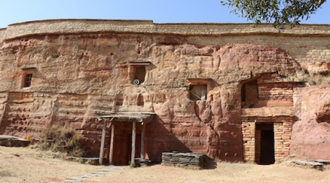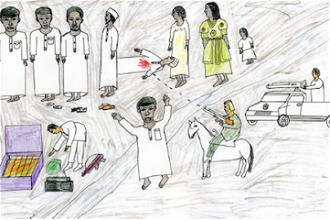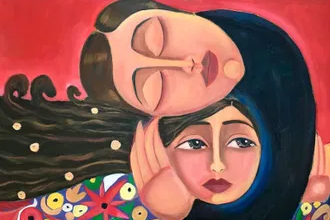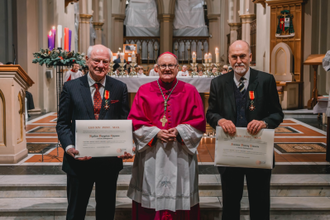Tigray: Killings, hunger and plundered churches

Monastery of Abune Agraham (Hagos Abrha Abay)
A comprehensive survey of heritage destruction in Tigray over the past 15 months indicates that, alongside widespread ethnic violence, religious and cultural sites - including museums, archeological sites, mosques, churches and monasteries - have been destroyed and looted. Tigray heritage items have been appearing for sale on websites, including eBay, raising suspicion that they have been plundered from churches during the conflict in Tigray. Scrolls, manuscripts and bibles are amongst treasures being sold on online marketplaces for only a few hundred pounds.
All this is according to Dr Hagos Abrha Abay, a philologist and expert in Ethiopian manuscripts, who was in Tigray at the outbreak of conflict in November 2020, and who has recorded damage to scores of ancient sites where artefacts were destroyed or looted. Since returning to Europe, where he is a Postdoctoral Researcher at the University of Hamburg, Dr Hagos and colleagues have monitored local reports from around Tigray and internet sales. Ethiopian troops and forces from neighbouring Eritrea have been accused of stealing the artefacts.
Lord David Alton has drawn attention to the findings. "Tigray - first they kill the people and starve them to death," he tweeted on 10 February, "and then they loot and plunder their artefacts as they try to destroy a people's culture and history." He takes the view that "war crimes and atrocities morph into Genocide."
Ethiopian federal government forces, alongside Eritrean forces, have been battling rebels from the northern Tigray region since November 2020 in a conflict that has killed thousands of people and displaced millions. Tigray has suffered catastrophic threats to civilian life for its seven million inhabitants, including agricultural disruption, food scarcity, declining health services, destruction of the electrical supply, no transportation, no phone service, and almost a complete blockade which stops humanitarian aid getting in. The United Nations (UN) says that "severe hunger" is hitting ever more people in Tigray. Around 2.2 million people are suffering an extreme lack of food and half of all pregnant and breastfeeding women are suffering from malnutrition, according to the UN's World Food Programme. The health systems in Tigray are in a state of collapse.
Tigray is a land of precious heritages with thousands of monasteries and churches, about 150 of them rock hewn. Around 40 churches and monasteries have had a general assessment of damages, Dr Hagos reports, but hundreds of others are likely to have been affected by hostilities but details are unrecorded.
Early in the conflict, at the end of November 2020, there was a massacre in the holy city of Aksum. The Church of Our Lady Mary of Zion in Aksum is thought to be the treasury of the biblical Ark of the Covenant, and when Eritrean troops surrounded it many people stayed on the church compound hoping to protect it. It is known that hundreds were killed but full details of the outcome are unknown. Throughout the conflict there has been a pattern of targeting churches on their holy days and festival days when large numbers of people are in attendance. Churches and monasteries, which were historically used as places of asylums and refuge during conflicts, are no longer places of refuge for Tigrayans families. The sanctuaries themselves have been destroyed.
Dr Hagos has given detailed news of some of Tigray's churches. The famous rock hewn Ger'alta churches in east Tigray have been damaged by shelling, including the 14th century church Abuna Abraham known for its diverse architectural features and wall paintings. Priests and civilians were intimidated in the monastery of Abuna Yematta of Guh, a place dedicated to one of the 6th century 'Nine Saints' and known for its ancient frescos; 19 civilians were killed and two injured here on 7 May 2021.
The Emperor Yohannes IV Palace, the home of a significant Ethiopian king from the 19th century, is situated in the Tigrayan capital, Mekelle. The palace was renovated and transformed into a museum with UNESCO's assistance, but most of the cultural artifacts in the museum have now been damaged or looted by Ethiopian forces.
Ethiopia's Nobel Prize-winning Prime Minister, Abiy Ahmed Ali, comes under heavy criticism from Dr Hagos, and also the Ethiopian Orthodox Tewahido Church, which did not speak out when Aksum was attacked. The Orthodox Church has splintered under pressure of the civil war. Dr Hagos says, Tigrayan society "feels betrayed by both the state and the church."
LINK
See also: www.independent.co.uk/news/world/africa/ethiopia-relics-artefacts-tigray-conflict-b2010985.html


















